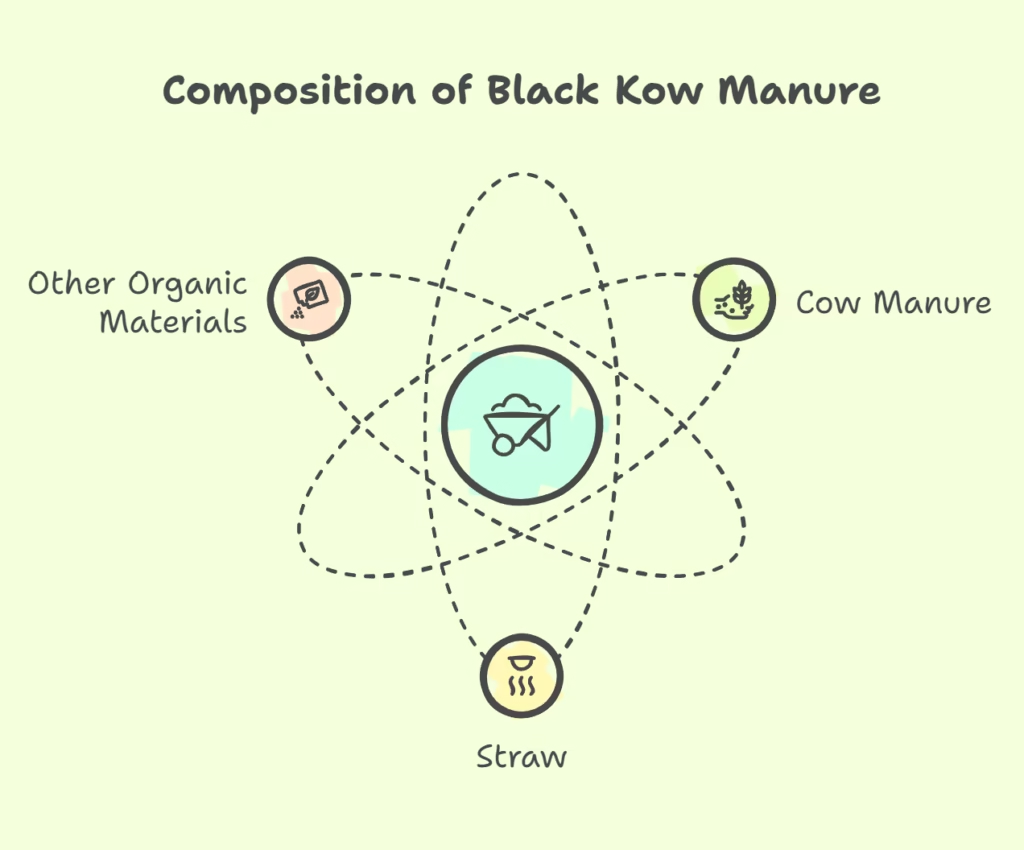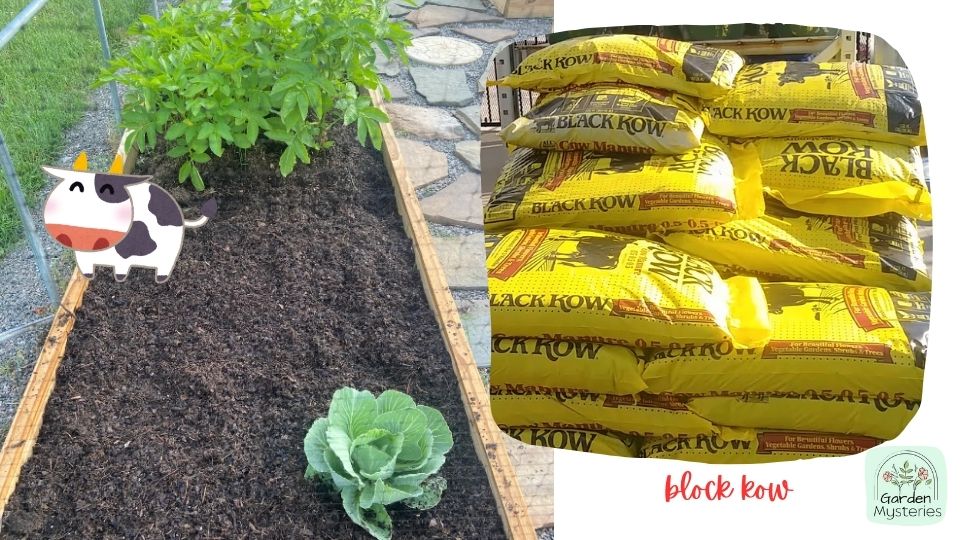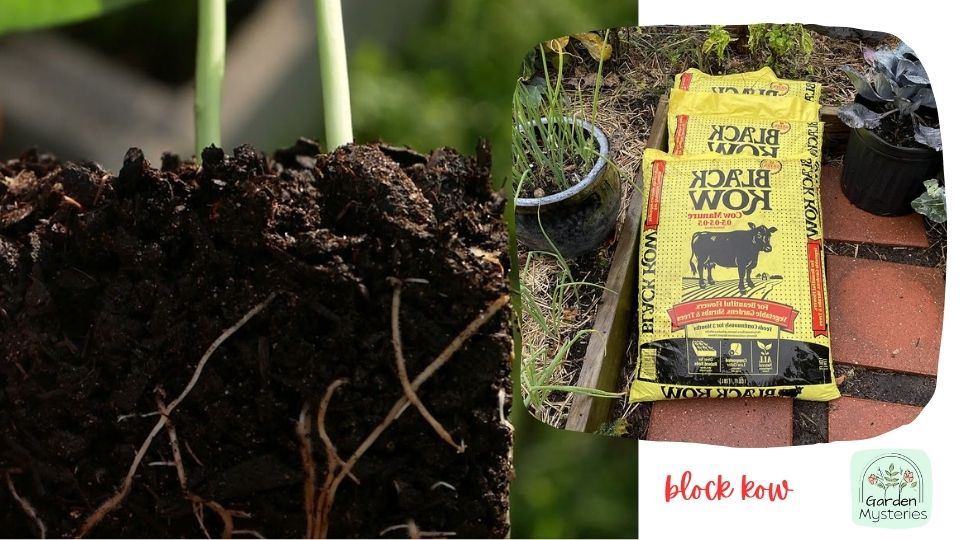
Black Kow Disadvantages: What Gardeners Should Know Before Using It
Last week my neighbor started using Black Kow as a fertilizer for her plants. So before that, she asked me, Are there any Black Kow disadvantages? I didn’t know myself then.
When I searched for the answer, I discovered that it was not exempt from the existence of certain Black Kow disadvantages like pathogens and bacteria, weed and pest seeds, rodents, salt accumulation, feedlot issues, environmental problems, etc. These are expected from cow manure compost for the soil.
What Is Black Kow?
Black Kow is a well-known brand of composted cow manure, widely utilized as an organic soil amendment in gardening and agriculture. Comprising a blend of cow manure, straw, and other organic materials, Black Kow is meticulously composted to break down the components, rendering them more accessible to plants.
It serves as a natural fertilizer, enhancing soil structure and supplying essential nutrients, fostering plant growth. This nutrient-rich product finds applications in various contexts, including gardens, lawns, and landscapes.
However, it’s important to note potential Black Kow disadvantages, like nutrient imbalances, salt accumulation, and pH shifts in the soil. While suitable for many plants, caution is advised with acid-loving species and delicate seedlings.
When applied in accordance with guidelines, Black Kow can offer a viable and environmentally friendly means of nurturing healthy and vivid plant life.
Black Kow Manure Ingredient
Black Kow manure is composed of a mixture of key organic ingredients, primarily centered around cow manure and additional organic matter. The main ingredients in Black Kow manure include:
- Cow Manure: The foundation of Black Kow, cow manure is a rich source of nutrients that plants require for healthy growth. It provides essential elements like nitrogen, phosphorus, and potassium.
- Straw: Straw is often blended with cow manure to help with aeration and moisture retention. It also contributes to the overall structure of the compost.
- Other Organic Materials: Various organic materials might be included in the mixture to enhance the composting process and provide additional nutrients. These could encompass plant matter, leaves, and other compostable materials.
When to Apply Black Kow Manure?
Black Kow manure can be a valuable addition to your gardening routine, contributing to healthier and more vivid plant growth. When applying Black Kow manure, consider the following guidelines for optimal results:
Immediate Application
Black Kow can be directly incorporated into your planting beds, providing an instant nutrient boost to the soil. This is particularly effective when establishing new plants or preparing the soil for planting.
Spring Application
The ideal time to integrate Black Kow into your soil is during the early spring. As soon as the soil becomes workable after winter, you can mix the composted manure into the soil. This lets plants access nutrients as they begin their active growth phase.
Fall Application
Another favorable application time is early fall. Adding Black Kow to the soil before the dormant period ensures that nutrients are available to plants once they resume growth in the following spring.
Harvest Timing
When using Black Kow on edible crops, it’s important to consider the timing of harvest. For food crops, like vegetables, ensure that the manure is applied at least 90 to 120 days before harvesting.
This buffer allows the proper breakdown and assimilation of nutrients, reducing the risk of contaminants reaching the harvested produce.
Southern Climates
In regions with milder winters, like southern climates, you can even apply Black Kow in late winter. This timing provides a nutrient boost just as plants are gearing up for spring growth.
Make sure to follow the manufacturer’s recommendations and consider conducting soil tests to gauge nutrient levels and pH before applying Black Kow. This proactive approach ensures that your plants receive the right nutrients at the right time, contributing to their overall health and vitality.
What Are the Disadvantages of Using Kow Manure?
Using cow manure, including products like Black Kow, as a soil amendment has several potential disadvantages that should be considered. While it can be a valuable source of nutrients, there are drawbacks that need to be addressed:
Pathogens and Bacteria
Cow manure can contain dangerous pathogens and bacteria, like E. coli, which pose a risk of contaminating crops and causing foodborne illnesses if not properly treated or handled.
Environmental Impact
Composting cow dung outside of controlled environments like biogas units can release significant amounts of methane into the atmosphere, contributing to greenhouse gas emissions and climate change.
Air and Water Pollution
The improper management of cow manure can lead to groundwater contamination because of the leaching of nutrients and pollutants. Additionally, the excessive application of manure can contribute to nutrient runoff, leading to water pollution in nearby water bodies.
Weed and Pest Seeds
Cow manure can contain weed and pest seeds, which may result in unwanted plant growth in your garden or landscape.
Rodents and Pests
Storing and managing cow manure can attract rodents and other pests, leading to potential hygiene and health issues.
Nutrient Imbalance
Using relatively large quantities of cow manure home depot to achieve high-quality crops can potentially lead to nutrient imbalances in the soil, affecting plant health and growth.
Air Quality Issues
Burning cow dung, often in the form of dung cakes, can produce high levels of smoke and ash, impacting air quality and contributing to indoor air pollution.
Salt Accumulation
Cow manure can contain elevated levels of salts, which, if applied excessively over time, can build up in the soil and negatively affect plant growth and soil health.
Food Contamination
If cow manure comes into contact with crops or food, it can lead to the spread of pathogens like Salmonella, Listeria, and E. coli, causing foodborne illnesses.
Parasites and Roundworms
Cow manure can carry parasites and roundworms that may survive in the soil and pose risks to humans and animals.
Labor and Time-Intensive
Collecting, storing, and managing cow manure compost can be time-consuming and labor-intensive. It also involves handling waste materials, which can be unpleasant and unsanitary.
Feedlot Disadvantages
Manure from feedlots can contain high levels of nitrogen and phosphorus, which, if not managed properly, can lead to water pollution in nearby water bodies.
Do you use Physon 20? Here are some alternatives you can use instead of Physon 20.
On What Plants Shouldn’t I Use Black Kow?
While Black Kow is beneficial for many plants, caution should be exercised with the following:
- Acid-Loving Plants: You should avoid using Black Kow on acid-loving plants like blueberries, azaleas, and rhododendrons, as it may affect soil pH.
- Sensitive Seedlings: Delicate seedlings might be sensitive to the nutrient levels in fresh cow manure. You should let the black kow manure to compost before using them.
- Indoor Plants: because of potential odors and drainage issues, it’s best to avoid using Black Kow on indoor plants.
- Plants Near Harvest: For edible crops, avoid applying Black Kow within 90-120 days of harvesting to prevent contamination risks.
Make sure to research your specific plant’s requirements and consult local gardening resources for tailored recommendations. Black Kow works for me well, but you might need something different according to your soil condition.
FAQs
Is Black Kow manure safe for edible crops?
Yes, but caution is needed for Black Kow Disadvantages. Applying Black Kow manure within 90-120 days before harvest could lead to contamination risks. Ensure safe application and consider alternative fertilizers for crops nearing harvest.
What’s the best way to minimize Black Kow’s disadvantages?
Follow recommended application rates, compost cow manure properly, monitor soil conditions, and consider performing soil tests. Combining Black Kow with other soil amendments can also help mitigate potential drawbacks.
Is Black Kow recommended for indoor plants?
Generally, no. The potential odor and drainage issues associated with black cow manure make it less suitable for indoor plants. Consider using indoor-specific fertilizers and amendments instead.
What are the alternatives to Black Kow for soil improvement?
Alternatives include other composted cow manures, composted plant materials, and commercially available organic soil amendments. Each option comes with its own benefits and considerations for use.
How does Black Kow compare to synthetic fertilizers?
Black Kow is organic and can improve soil structure, but it also has potential disadvantages. Synthetic fertilizers offer more precise nutrient control but may lack the organic benefits of composted cow manure and horse manure.
If you want an elaborate idea of the differences between Black Kow and Miracle Grow, you can take a look and find out about black kow vs miracle gro.
borshon96
Recommended

9 Effective Tips for Balcony Gardens for Beginners

Best Homemade Fertilizer: Banana Peel for Plants


Philodendron Neon Heartleaf: Your Most Obedient Houseplant




